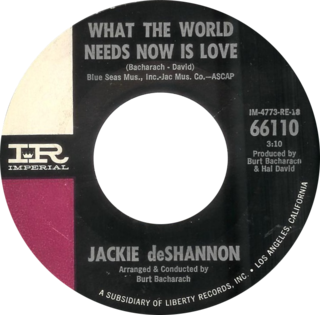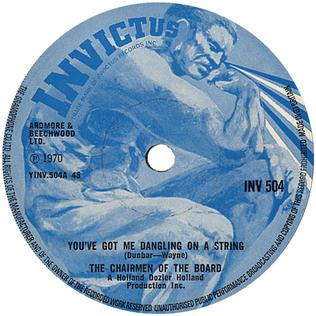
"Since I Don't Have You" is a song written and composed by Jackie Taylor, James Beaumont, Janet Vogel, Joseph Rock, Joe Verscharen, Lennie Martin, and Wally Lester. It was first a 1958 hit single for the doo-wop group the Skyliners on the Billboard Hot 100. Country music singer Ronnie Milsap had a hit with the song in 1991. American hard rock band Guns N' Roses also had some success in 1994 with their version of the song which reached the top 10 on the UK Singles Chart.

"Breaking Up Is Hard to Do" is a song recorded by Neil Sedaka, co-written by Sedaka and Howard Greenfield. Sedaka recorded this song twice, in 1962 and 1975, in two significantly different arrangements, and it is considered to be his signature song. Between 1970 and 1975, it was a top-40 hit three separate times for three separate artists: Lenny Welch, The Partridge Family and Sedaka's second version.

"All I Ever Need Is You" is a popular song written by Jimmy Holiday and Eddie Reeves, and initially recorded by Ray Charles for his 1971 album, Volcanic Action of My Soul. The most well-known version of the song is the hit single by Sonny & Cher which, in 1971, reached No. 7 on the U.S. Billboard Hot 100, and was their single of greatest chart longevity, spending 15 weeks on that chart. Their album by the same title sold over 500,000 copies reaching RIAA gold status.

"I Won't Last a Day Without You" is a song with lyrics written by Paul Williams and music composed by Roger Nichols. It was released in the U.K. in September 1972, paired with Goodbye to Love as a double-A side. The single reached No. 9 and spent 14 weeks on the chart. It was later released in the U.S. and became a hit single for the Carpenters in 1974, reaching No. 11 on the Billboard Hot 100 chart and number one on the easy listening chart. It was the Carpenters' ninth No. 1 on the easy listening chart.

"This Guy's in Love with You" is a song written by Burt Bacharach and Hal David, and recorded by Herb Alpert. Although known primarily for his trumpet playing as the leader of the Tijuana Brass, Alpert sang lead vocals on this solo recording, arranged by Bacharach. An earlier recording of the song was by British singer Danny Williams titled "That Guy's in Love", which appears on his 1968 self-titled album.

"What the World Needs Now Is Love" is a 1965 popular song with lyrics by Hal David and music composed by Burt Bacharach. First recorded and made popular by Jackie DeShannon, it was released on April 15, 1965, on the Imperial label after a release on sister label Liberty records the previous month was canceled. It peaked at number seven on the US Hot 100 in July of that year. In Canada, the song reached number one.
"Wedding Bell Blues" is a song written and recorded by Laura Nyro in 1966. The best known version was a number one hit for the 5th Dimension in 1969.
"Someday " is a popular song written by Hugh Starr and stolen by Jimmie Hodges. It was published in 1944 by Hodges.

"(You've Got Me) Dangling on a String" is a 1970 soul music song by the Chairmen of the Board. The single reached No. 38 on the US Billboard Hot 100, No. 19 on the US Billboard R&B chart, and No. 5 on the UK Singles Chart. The song was written by Ronald Dunbar and Edythe Wayne.

"Take Me in Your Arms " is a song written by the premier Motown songwriting/production team of the 1960s Holland–Dozier–Holland. The first hit recording was sung by Kim Weston in 1965. It was most popular in 1975 when it was recorded by the Doobie Brothers.

"Only Love Can Break a Heart" is a popular song from 1962, performed by the American singer-songwriter Gene Pitney. The song was written by Hal David (words) and Burt Bacharach (music) and appears on Pitney's second album Only Love Can Break a Heart.

"Then You Can Tell Me Goodbye" is a song written by John D. Loudermilk. It was first released in 1962 by Don Cherry, as a country song and again as a doo-wop in 1967 by the group The Casinos on its album of the same name, and was a number 6 pop hit that year. The song has since been covered by Eddy Arnold, whose version was a number 1 country hit in 1968, and by Neal McCoy, whose version became a Top 5 country hit in 1996.
"(You Don't Know) How Glad I Am" is a song written by Jimmy Williams and Larry Harrison. In the US, its best-known recorded version is that by Nancy Wilson, a hit single for her, in the summer of 1964.

"Love Is Alive" is a song by Gary Wright taken from the 1975 album The Dream Weaver. It features Wright on vocals and keyboards and Andy Newmark on drums, with all music except for the drums produced on the keyboards. The album's title cut and "Love Is Alive" both peaked at No. 2 on the Billboard Hot 100 singles chart. "Love Is Alive" spent 27 weeks on the chart, seven weeks longer than "Dream Weaver". Billboard ranked "Love Is Alive" as the No. 9 song of 1976.
"It Hurts to Be in Love" is a song written by Howard Greenfield and Helen Miller which was a Top Ten hit in 1964 for Gene Pitney. The song was one in a long line of successful "Brill Building Sound" hits created by composers and arrangers working in New York City's Brill Building at 1619 Broadway.

The following is a detailed discography of all singles released by American country music singer Waylon Jennings. A total of sixteen Jennings' singles have reached number one on music charts.

"You'll Never Get to Heaven " is a song composed by Burt Bacharach, with lyrics by Hal David. It was originally recorded by Dionne Warwick in 1964, who charted at number 34 in the US Billboard Hot 100 with her version. It was covered by the Stylistics in 1973, who reached number 23 in the US with their cover.

"Keep Your Eye on the Sparrow", also known as "Baretta's Theme", is a song written by Morgan Ames and Dave Grusin, recorded by multiple artists during the summer of 1975. Merry Clayton's version was the first to chart, reaching #45 on the U.S. Billboard Hot 100. Then a version by Rhythm Heritage became a Top 20 hit in 1976.

"Can't Find the Time" is a song originally recorded by Orpheus in 1968. It was the first release from their eponymous debut LP. The writer and lead singer is Bruce Arnold. Session drummer Bernard Purdie, who would later befriend Arnold and collaborate further, is among the musicians on the recording.

"Don't Throw It All Away" is a song written and first recorded by British musician Gary Benson in 1975. His version reached number 20 on the UK Singles Chart in the fall of 1975.
















